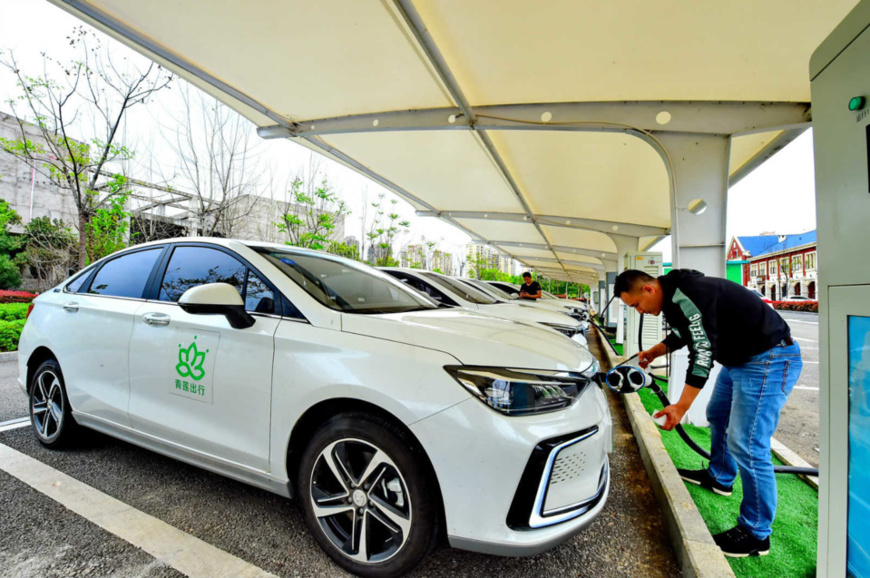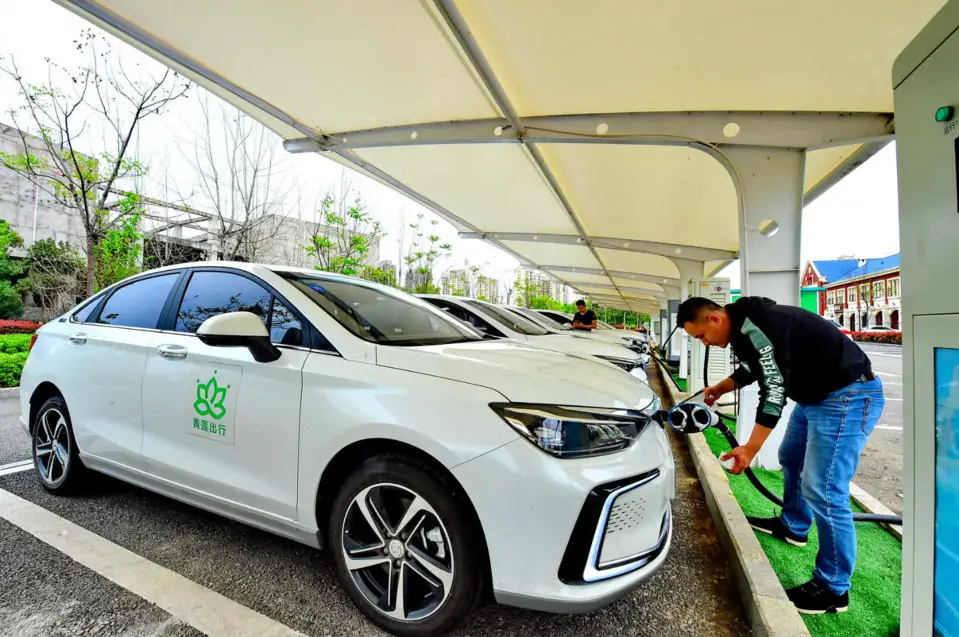By Lyu Qian, Xu Peiyu, People’s Daily Online

A man charges an electric vehicle at a charging station in Yueliangwan new district, Huichang county, Ganzhou of Jiangxi province in east China, March 27. (Photo by Zhu Haipeng, People’s Daily Online)
“New energy vehicle (NEV) production capacity in April basically reached the level of the same period last year,” said Miao Wei, Chinese Minister of Industry and Information Technology.
Miao made the remarks during an interview after the second plenary meeting of the third session of the 13th National People’s Congress on May 25. The minister also expressed full confidence in the future development of the NEV industry
NEV has always been a hot topic in the “two sessions” every year, as promoting wider use of NEV has been included in the Report on the Work of the Government for three consecutive years.
“The production and sales of both conventional automobiles and NEVs have been severely impacted by the novel coronavirus outbreak,” Miao introduced.
In light of the difficulty, China’s central government has unveiled policies and measures to stimulate the development of the industry. The government has decided to extend subsidies and tax exemptions for NEV purchases, which was due to be removed by the end of this year, by another two years, in a bid to restore NEV production and sales.
Since the beginning of this year, both central and local governments have rolled out a package of policies to support the automobile industry. The development of NEV, in particular, has been supported and encouraged by a series of preferential policies.
An executive meeting of the State Council on March 31 decided to extend subsidies and tax exemptions for NEV purchases to the end of 2022. A few days earlier, NEV charging facilities were included in the country’s “New Infrastructure” projects.
Guangzhou, capital of south China’s Guangdong province, in early March announced that it would grant each individual who buys a new energy vehicle a subsidy of 10,000 yuan ($1,398) from March to December. Besides, Shanghai government is now subsidizing NEV users on charging fees, and has shortened the time for NEV license registration.
These favorable policies resulted in an uptick in NEV sales. More than 100,000 Tesla models were sold across China in March, and the NEV sales of Beijing Electric Vehicle under Chinese automaker BAIC Motor Corp also bounced back to around 6,000 units in the same period. BYD, a leading electric vehicle maker in China, sold more than 20,000 NEVs in the first quarter.
The country would make continuous efforts in the supply, demand, and user sides in the next phase, in a bid to give a further boost to NEV development, according to the minister.
On the supply side, the Ministry of Industry and Information Technology (MIIT) will intensify efforts on the reform of streamlining administration and delegating power, improving regulation, and upgrading services, and liberalize the original equipment manufacturer production of new energy vehicles in an orderly manner. In addition, brand authorization will be piloted for R&D and innovative NEV enterprises.
On the demand side, apart from implementing relevant preferential fiscal and tax policies, the MIIT will also encourage battery swap programs and the use of NEV in the public services, such as law enforcement, logistics, sanitation, and public transport, so as to expand the demand for NEVs.
For NEV users, the MIIT will make greater efforts to construct charging and battery swap facilities and encourage universal standards of charging facilities. Furthermore, the ministry also encourages local governments to introduce preferential parking and travel policies for the use of NEV.
“In a word, we will always pay high attention to the development of NEVs, and work to ensure a better environment for using them, so that more consumers will be willing to choose it,” Miao concluded.
Miao made the remarks during an interview after the second plenary meeting of the third session of the 13th National People’s Congress on May 25. The minister also expressed full confidence in the future development of the NEV industry
NEV has always been a hot topic in the “two sessions” every year, as promoting wider use of NEV has been included in the Report on the Work of the Government for three consecutive years.
“The production and sales of both conventional automobiles and NEVs have been severely impacted by the novel coronavirus outbreak,” Miao introduced.
In light of the difficulty, China’s central government has unveiled policies and measures to stimulate the development of the industry. The government has decided to extend subsidies and tax exemptions for NEV purchases, which was due to be removed by the end of this year, by another two years, in a bid to restore NEV production and sales.
Since the beginning of this year, both central and local governments have rolled out a package of policies to support the automobile industry. The development of NEV, in particular, has been supported and encouraged by a series of preferential policies.
An executive meeting of the State Council on March 31 decided to extend subsidies and tax exemptions for NEV purchases to the end of 2022. A few days earlier, NEV charging facilities were included in the country’s “New Infrastructure” projects.
Guangzhou, capital of south China’s Guangdong province, in early March announced that it would grant each individual who buys a new energy vehicle a subsidy of 10,000 yuan ($1,398) from March to December. Besides, Shanghai government is now subsidizing NEV users on charging fees, and has shortened the time for NEV license registration.
These favorable policies resulted in an uptick in NEV sales. More than 100,000 Tesla models were sold across China in March, and the NEV sales of Beijing Electric Vehicle under Chinese automaker BAIC Motor Corp also bounced back to around 6,000 units in the same period. BYD, a leading electric vehicle maker in China, sold more than 20,000 NEVs in the first quarter.
The country would make continuous efforts in the supply, demand, and user sides in the next phase, in a bid to give a further boost to NEV development, according to the minister.
On the supply side, the Ministry of Industry and Information Technology (MIIT) will intensify efforts on the reform of streamlining administration and delegating power, improving regulation, and upgrading services, and liberalize the original equipment manufacturer production of new energy vehicles in an orderly manner. In addition, brand authorization will be piloted for R&D and innovative NEV enterprises.
On the demand side, apart from implementing relevant preferential fiscal and tax policies, the MIIT will also encourage battery swap programs and the use of NEV in the public services, such as law enforcement, logistics, sanitation, and public transport, so as to expand the demand for NEVs.
For NEV users, the MIIT will make greater efforts to construct charging and battery swap facilities and encourage universal standards of charging facilities. Furthermore, the ministry also encourages local governments to introduce preferential parking and travel policies for the use of NEV.
“In a word, we will always pay high attention to the development of NEVs, and work to ensure a better environment for using them, so that more consumers will be willing to choose it,” Miao concluded.
 Menu
Menu
 China’s new energy vehicle market embraces sound momentum for development
China’s new energy vehicle market embraces sound momentum for development
















